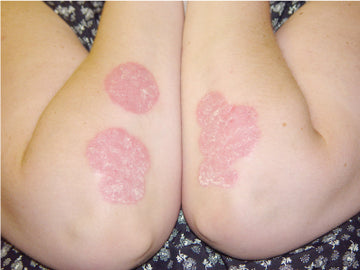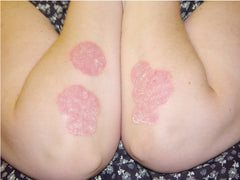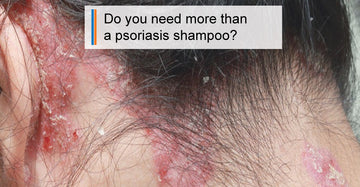
Psoriasis affects approximately 3% of the world’s population. It is also the #1 auto-immune disease in the world. It is a chronic inflammatory skin condition where the body produces more skins than can naturally be exfoliated. The disease may initially appear as simple dry or scaly patches on the skin. Normally skin cells take around three to four weeks to replace themselves. However, with psoriasis the body produces skin cells much more rapidly sometimes in as little as two to six days. Because the skin cells grow so quickly the body does not have enough time to naturally remove the old dead cells and the result is a buildup of thick dead cells on the skin that can often look like plaque and be silver in color.
The History of Psoriasis
As we learn all about psoriasis we need to look at the history of this disease. Scientists have identified signs of the deceases on mummified bodies that date back to the early Christian era. This means that It is centuries old. In the Middle Ages people who had psoriasis were often associated with people who had leprosy and society often labeled them as outcasts. The first doctor to clinically describe psoriasis occurred in the early 19th century. His name was Doctor Robert Willan.
What Type of People Get Psoriasis?
Psoriasis does not discriminate. It can affect all types of people of any age, race or gender almost equally. Since this article is being written to learn all about psoriasis we will try to provide you with some statistics but it should be understood that these are just statistics and anyone can get the deceases. Typically it is found in individuals of all races between the ages of 11 and 45. It should be noted that the percentage of African Americans diagnosed with psoriasis is about 1% less than Caucasians. Only certain Eskimos and Native Americans have remained unaffected by psoriasis. There is no clear scientific explanation as to why these two groups are not affected, but it is believed that genetic or environmental factors play a role.
All about Psoriasis and What Causes It
The cause of psoriasis still remains unknown. Scientists do believe it is genetic in nature and that the immune system does play a role in the disease. Genetic research has discovered certain genes that are associated with psoriasis. However, simply having these genes does not mean a person will ever show any symptoms of psoriasis. Some studies have shown that environmental and even psychological conditions can play a role in developing the decease.
It seems in most cases that psoriasis is often triggered by some form of trauma to the body. The trigger could be an illness or severe stress. It could even be something as simple as a severe sunburn. Some research has even shown that some medications can trigger it. Today we don’t know the specific cause, however we do know that once the disease is triggered unfortunately there is no cure. It should be noted that psoriasis is NOT contagious. Even individuals that have open lesions are not infectious. Psoriasis has never been shown to be passed from person to person.
All About Symptoms
Psoriasis can be seen on small parts of the body or in severe cases cover large areas or the entire body. Generally a person with psoriasis will show signs of red patches on the skin. In some cases the patches of dry skin may get thick from all the skin cells and begin to look like plaque.
Psoriasis affects everyone differently but normally each person will have one or more of the following symptoms:
Itching and irritation
Red patches on the skin
Burning sensation or soreness
Skin that has cracked due to dryness with possible bleeding
Red skin covered with scales that can be silver in color
Swollen or stiff joints
Fingernails or toenails that are thick and have ridges.
Dandruff or flaky skin on the scalp
For some people with psoriasis these symptoms may come and go in cycles. At times it may be barely noticeable and then a flare up occurs and the skin becomes very irritated again. Changes in seasons may also affect psoriasis. More people seem to have flare-ups in the winter due to the dry climate caused by the way we heat our homes.
Conclusion
There is a lot to learn about psoriasis and how do you treat psoriasis with all the research being done it is a constant learning process. If you want to know all about psoriasis you will have keep up with all of the latest studies and treatments that are being tested. A great resource all about psoriasis is the National Psoriasis Foundation.







